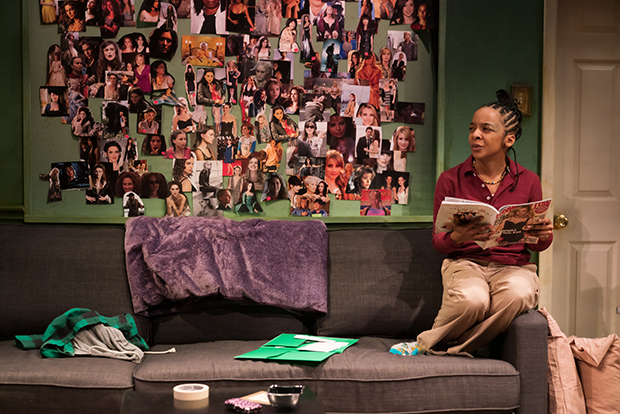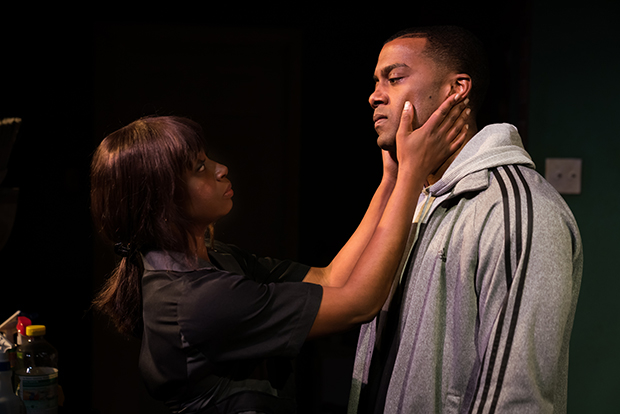All the Natalie Portmans Asks: More Natalies, More Problems?
C.A. Johnson’s ambitious new play makes its off-Broadway debut.

(© Daniel J. Vasquez)
A celebrity collage occupies the wall over the sofa in Keyonna's home. Beautiful white women (most of them Natalie Portman) jockey for space in this magazine cut-out harem, with Whoopi Goldberg (the one black woman on the wall) watching over them like a stern madam. This "dream board" serves as a constant reminder of the Hollywood-manufactured ideals and aspirations that simultaneously fuel and frustrate the protagonist of C.A. Johnson's All the Natalie Portmans, now making its New York premiere at MCC Theater. For Keyonna is not a rich white woman from Hollywood, but a working-class black lesbian teenager living in Northeast Washington, DC.
Keyonna (a pugnacious, sharp-tongued, instantly lovable Kara Young) shares the modest apartment with her big brother, Samuel (Joshua Boone), and (when she's ever home) their mother, Ovetta (Montego Glover). Keyonna's father died years ago, and it was from him that she inherited her passion for film. Some day, she wants to be a powerful screenwriter and producer. Both Samuel and Ovetta work long hours to keep the family afloat, while Keyonna excels in her AP courses (when she's not cutting class). Samuel is particularly mindful of Keyonna's academic progress (Boone is a natural as the protective older brother). Both siblings are worried about mom. Despite Ovetta's claims of having "one drink" with landlord Mr. Epps (a barking Raphael Peacock), we somehow don't believe her.

(© Daniel J. Vasquez)
This is despite an impressively nuanced performance from Glover. While she looks exhausted when no one is looking, Ovetta is not a drunk who slurs her words and stumbles into furniture. Rather, she's the kind of practiced alcoholic who knows how to pull it together and work through a hangover. Samuel and Keyonna can discern the signs, but we get the sense than most of the outside world cannot, making this an incredibly realistic depiction of a high-functioning addict.
Johnson injects an element of magic into this domestic drama in the form of Natalie Portman (Elise Kibler, finding the emotional center of the role without resorting to strict impersonation). Portman pops up dressed in one of her iconic costumes (excellent approximations by Jennifer Moeller), itching to role-play with Keyonna. She is, of course, a figment of Keyonna's imagination. And while she brings Keyonna great joy, she increasingly feels like an addiction in her own right, as Keyonna's sober reality hurtles further and further from Natalie's intoxicating fantasy.

(© Daniel J. Vasquez)
Director Kate Whoriskey deftly stages a production that leaves room for both the magical and realistic. Donyale Werle's living-room-set-with-secrets gives us a strong sense of Keyonna's home life, although it is not always so successful at conveying the scenes that happen elsewhere. Stacey Derosier's assertive lighting helps to instantly create the dimension shift necessary for when Natalie comes out to play, as does Sinan Refik Zafar's cinematic sound design (the Star Wars segment is a delight). But in a time before Hollywood's discovery of Wakanda (the play is set in 2009), we begin to see the injustice of it all: Why is it that only actors who look like Natalie Portman get to live many lives, and go on fantastic journeys? The only adventure Keyonna seems primed to make is to her mother's car after they get evicted.
There's a gut-punch of a 90-minute play somewhere in All the Natalie Portmans (which runs two hours, 10 minutes). It's about the cruel unattainability of the American dream and the powers of persuasion that convince millions of us to chase it anyway. Unfortunately, Johnson gets bogged down in too many tangents, including a romantic intrigue involving Samuel's girlfriend, Chantel (an underused Renika Williams). Johnson is clearly a dramatist with a lot to say, but she need not say it all at once. After seeing the promising (if flawed) All the Natalie Portmans, I'm eagerly awaiting her next play.











